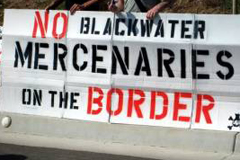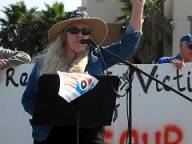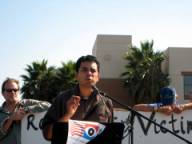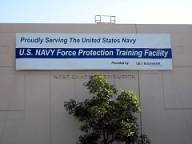NEW BLACKWATER PROTESTS MARK ANNIVERSARY OF NISOUR SQUARE SHOOTINGS
East County Magazine (2008-10) Gayle Early
This Page:
https://copswiki.org/Common/M654Media Link:
http://www.eastcountymagazine.org/%3fq%3dnew_blackwater_protests%20type%3d%22html%22More Info: Blackwater,
Blackwater Otay
Congressman Bob Filner and Assembly candidate Ray Lutz of East County speak out against Blackwater at Otay Mesa Rally
Story and photos by Gayle Early
 |
| Sign from a military families organization opposed to Blackwater. |
October 1, 2008 (Otay Mesa) – In September 2007, 17 people were shot to death in the
Nisour Square traffic circle in Baghdad, Iraq, by Blackwater Worldwide security guards contracted by the U.S. State Department. Two dozen more civilians were seriously injured, including a lawyer shot in the back four times as he tried to run away. Marking the anniversary, about 150 protestors demonstrated outside Blackwater West’s new Otay Mesa Naval Training Facility on Sunday, September 14, raising concerns about the private military contractor’s presence in San Diego and along an international border already rife with tension.
No one has been prosecuted for the Iraqi civilian deaths. Investigations by the Iraqi government and the U.S. military, as well as initial assessments by the FBI revealed that the attack was unprovoked, as reported in the
Washington Post. Blackwater claims their guards fired in self-defense.
Robert Pelton, a reporter who rode with Blackwater Worldwide in Iraq, in 2004, said in a
CBS interview, “Using a weapon to clear traffic and push people back was very, very common and typical of each run, maybe two or three weapon discharges per run.”
Pelton added, referring to the aggressive tactics, that “the Blackwater security guards were doing exactly what the State Department wanted” to protect its diplomats.
There was a notable absence of major media covering the local protest. Demonstrations at four other Blackwater facilities across the country also took place over the weekend.
In the Nisour Square incident, four Blackwater vehicles were stopped at a barrier erected to protect construction workers. Apparently, the guards fired weapons to stop other cars from entering the traffic-jammed circle.
A
witness, a traffic guard, recounted how Blackwater operatives shot a man driving into the traffic circle while commuters scattered, confused and panicked. His mother, a doctor, cried for help and dove to the driver’s seat to hold him. The car, an automatic, continued rolling, so the guards shot and killed the mother and continued shooting the car with machine guns until the car exploded. The son was also a medical student. A nine-year-old boy was shot in the head and died in his father’s arms. Blackwater security guards also shot into a city bus during the traffic circle melee.
 |
| Carol Jahnkow, Executive Director of the Peace Resource Center of San Diego |
Carol Jahnkow, Executive Director of the Peace Resource Center of San Diego, observed, “To date, no one has apologized. No one has stood trial. There has been no restitution to the families.”
Representative Bob Filner, speaking to the rally via phone from Washington, D.C., said, “The more we learn about Blackwater the more we know that this is the kind of company, this is the kind of activity we don’t want in San Diego.” The Otay facility is in Filner’s district.
“They’re completely unaccountable,” said Filner. “They shoot first, they ask questions later. They don’t think that they’re subject to any law. We see what they’re doing in Iraq, and now they want to join us here in San Diego.”
Legal experts have said that the security guards are probably immune to prosecution because of State Department agreements with Iraq regarding private contractors.
Several Iraqi families have filed civil
lawsuits charging Blackwater with war crimes, and the Justice Department is still investigating the Nisour Square incident.
Jahnkow read from one of the civil suits, documented on the
Center for Constitutional Rights: “‘Blackwater created and fostered a culture of lawlessness amongst its employees, encouraging them to act in the company’s financial interests at the expense of innocent human life.’”
“These are not people we want in our community,” Jahnkow added. “In the year and a half leading up to this, Blackwater took part in at least 10 known shootings. It’s the tip of the iceberg.”
Paramilitary Group on the Border?
“I don’t think it’s any accident that they’re right at the border,” said Filner. “They want to take over some of the law enforcement—so-called law-enforcement—there. Can you imagine an unaccountable group that shoots first, asks questions later, what kind of tragedies we will have at the border?”
Filner noted that Blackwater “won’t even tell the parents of their own employees what happened if there’s injury or death.”
 |
Sign from a military
families organization opposed to Blackwater. |
Military and veterans groups also participated in the protest. Dave Wiley with San Diego Veterans for Peace asserted, “From some of my research, Blackwater has engaged in training with the Border patrol—specifically, in San Diego and Texas.”
But later, Brian Bonfiglio, Vice President of Blackwater, said in a phone interview with
East County Magazine, that there are no contracts between Blackwater and the Border patrol. “There never has been, that’s not why we’re there. If you walked into that facility, you will see ship simulators and Navy stuff everywhere.”
 |
| Pedro Rios |
Pedro Rios, representing the American Friends Service Committee and the U.S.-Mexico Border Project, raised concerns about the increasing militarization of border communities, saying “we’ve been told that Blackwater’s [being] here on the border is just a symbolic gesture and we shouldn’t be concerned that they would have any impact on the border communities.”
“We should all be concerned,” Rios said.
“I know what it is to see border patrol taking after people, detaining them, and beating them up. I know what it is to see checkpoints where people randomly search and ask questions. I know what it is to have our civil liberties called into question,” said Rios.
“When we add the component of the paramilitary, mercenary group on our border, then we’re really calling into question what is at stake. And what’s at stake is our basic principles for democracy.”
“The Border Patrol already uses the expansive bullet, when they strike an individual they blow up,” Rios said. “What will it mean, then, to have the type of operations that Blackwater is used to having in other parts of the world? Have we denigrated to the extent in our society where we will permit this type of paramilitary organization to operate in our communities?”
“What’s at stake is not [just] the fact that this mercenary group might cause another Nisour Square here on the border,” Rios added, “but that all of our civil liberties are at stake.”
Gregory Morales of the Mexican American Political Association, spoke of racial bias he observed among Border Patrol and Blackwater personnel during last October’s wildfires, reflecting a bias that exists in the larger community.
Morales was alarmed when he’d heard an official say on TV, ‘We’re helping the right kind of people.’
“And the people who were around there, none of them looked like me,” Morales said. “So we went down to Chicano Park and started food collection and distribution for
any victims of the fires. We sent a group from
MECh A (a Chicano student organization from Southwest College) down to Potrero to deliver food to the migrants, the undocumented, to the people that were there, everybody, everybody that was in need.”
“The Blackwater people and the Border Patrol, who were working together in the same station, said, ‘Why do you want to go there, there’s nothing but drug addicts and criminals.’ A broad generalization of all the people there. Because they look like me?” asked Morales.
This matters, Morales said. “It may be me today, or maybe somebody that looks like me or sounds like me or has my last name, [but it’s] going to be you tomorrow. Are we going to start putting triangles on our chests? Or stars?”
In what he considered to be “manipulativeness,” Rios described Blackwater’s assistance during the fires near Potrero as a “lobby-evacuation center where they were providing stickers and that sort of stuff.”
Morales said, “We’re being conditioned to accept this type of presence as a norm for our lives.”
Asked about Blackwater being termed a ‘mercenary, paramilitary organization,’ Bonfiglio said, “Mercenaries conduct offensive operations for other countries. We don’t do that, never have, never will. We’re an American company, working for Americans, protecting Americans.”
Blackwater is owned by Eric Prince, who heads a consortium of corporations under the Prince Group. They manufacture armored personnel carriers, helicopters, unmanned remote piloted airships, the BW-15 (Blackwater assault rifle); and are also involved in military training, security, property management, and the list goes on, said Wiley.
“I’d prefer to not have them involved in the training of our personnel,” Wiley said. “The privatization of things that should be the province of our government is just something that I stand opposed to.”
Wiley noted that the Prince group has materials manufacturing and mechanical equipment manufacturing in both Juarez and Monterrey, Mexico. “And then we have this facility less than a mile from the Otay-Mesa border crossing. What’s the relationship?” He also asserted that Blackwater was actively bidding for contracts in the war on drugs in South America.
 |
| Blackwater facility in Otay Mesa. |
Asked why the Navy doesn’t train itself, Bonfiglio responded over the phone, “Why doesn’t the Navy build their own battleships? Why doesn’t the Army build their own tanks? Why doesn’t the Air Force build their own aircrafts? Why doesn’t NASA build its own space shuttle?”
He concluded, “Private companies like ours are more efficient, cost less money, and do a faster job than, let’s say, the government system.” Bonfiglio added, “That’s been the relationship between the U.S. military, the U.S. government, and private professional companies like ours. It’s nothing new.”
Bonfiglio emphasized that governments have hired companies for their expertise for hundreds of years. “I’m sure you’re not asking for a history lesson,” he said, “but this is something that has taken place since…years ago.”
Bonfiglio said Blackwater is in San Diego because it’s close to home for the Navy.
Any contract bidding for activities in South America is “an untruth,” he stated.
From Potrero to Otay
“We kicked you out of Portrero. We will kick you out of San Diego. And we will get you the hell out of Iraq,” said poet protestor Jim Moreno.
Amidst intensive civic protest Blackwater pulled its plans to develop military training facilities in Potrero, a rural East County community that straddles Filner’s 51st congressional district and retiring Representative Duncan Hunter’s 52nd district.
Bonfiglio said that Blackwater abandoned plans for the Potrero facility when they found they could not meet the county’s noise ordinance of 50 decibels at the property line. The project was pulled March 7, 2008.
“They said they had no other plans in San Diego,” said Ray Lutz, organizer of the Citizen’s Oversight Projects, a citizens watchdog group, and founder of
www.StopBlackwater.net. Now the Democratic candidate for the 77th Assembly District, Lutz told listeners at the rally, “Then we find out, on April 21 [2008], they had these secret plans.”
Lutz said that to move into the Otay Mesa facility, Blackwater used pseudonyms such as ‘Southwest Law Enforcement’ to “slip under the radar,” employing phrases such as ‘vocational training center’ in lieu of ‘warfare training center.’ “Can we trust them to tell us the truth?” Lutz asked his audience.
Blackwater’s contractor, Raven Development, under the parent company B&J Holdings, filed for permits to lease the warehouse on Siempre Viva Road in Otay Mesa.
 |
| Ray Lutz. |
Lutz alleged that the City of San Diego also cooperated in changing computer listings from ‘firing range’ to ‘modular training units’ so “no one could find what they were putting inside.”
The City did not return phone calls by deadline to respond to these assertions. However, the City Attorney’s office wrote in a press release June 4, 2008:
“Blackwater USA never submitted any of the applications for the permits in its name and has failed to comply with, and complete, the City’s required permitting process. The proper procedure may well have required public participation in the project review process….”
The City of San Diego’s Development Services Department informed Blackwater that further permit processing and environmental compliance was necessary, prompting Blackwater to sue the City for civil rights violations. Blackwater won its case in federal court.
On May 5, 2008, Mayor Jerry Sanders directed the City’s Chief Operating Officer, Jay Goldstone, to conduct an
investigation into the permits issued to Blackwater.
In the
City Auditor’s Report, on June 5, 2008, Eduardo Luna, the City’s internal auditor, asked the key questions:
• Did Blackwater represent its identity or intended use of the Otay facility?
• Did City staff properly issue permits in compliance with codes and regulations for the facility?
• Is the designation of ‘vocational/trade school’ appropriate for the site?
Bonfiglio pointed out that the City determined that Blackwater never tried to hide its business, business name, or its intent for the facility.
But the report highlighted a few confusions.
Three different contractors applied to make facility improvements. In September, 2007, Noble Construction applied for permits for ‘warehouse with offices’ for the owner/lessee, ‘Southwest Law Enforcement Training Enterprises.’
Noble applied a month later, leaving the “owner/lessee” portion of the form blank, listing the purpose for the facility as “training.” In February, 2008, Rowen Electric applied to do electrical improvements for facility owner/lessee listed as ‘Safchild.’ Finally, TSA Contracting applied for a permit to add an indoor firing range for facility lessee ‘Raven Development,’ for the purpose listed, again, as “training.”
However, on January 1, 2008, Blackwater Lodge & Training Center, Inc. filed a business permit, listing its purpose as “Educational Services” and stating: “Blackwater will conduct security training for the United States Navy.”
In the City’s words, “We determined that Blackwater did not
misrepresent their identity. Regarding the use of the facility, it was inconclusive if two of the applications submitted for the use of the facility were intentionally misrepresented or an
oversight.”
Regarding using “business fronts” to open what will ultimately be a Blackwater military training facility, Bonfiglio said, “You will never see ‘7-11’ on a permit to build walls or do tenant improvements on a building. The company that applies for the permits is the construction company doing the work.”
The City of San Diego does not require business owners’ names on building permit applications.
City Attorney
Michael Aguirre filed with the Ninth Circuit Court of Appeals. In another press release, July 3, 2008, his office wrote, “Blackwater is seeking to force the City to issue a certificate of occupancy that would change the building from warehouse to military training uses. This use is not fully consistent with the industrial zoning of the Otay Mesa Development District and its permitted uses.”
Bonfiglio said that Blackwater has won in federal courts twice. He said that Aguirre “is asking us to go through a process like no other like company in San Diego has ever gone through. And I could name other businesses that are supporting the United States Navy on the same contract that we are, and have fire-arms ranges in San Diego city limits, and they are not and have never been required to do what the city attorney is asking us to do. It’s political posturing at its finest.”
“I’m sorry,” said Bonfiglio, “there’s nothing in this process that would require me or my company to call the East County Democratic Club or the Peace Resource Center and tell them, `Hey, I’m opening up a Navy Training Facility here in Otay Mesa.’ Come on, that’s crazy.”
Jahnkow, addressing Blackwater at the rally, said, “You may have tricked the city, but the show ain’t over. We’re going to keep protesting. We’re going to do everything we can to get you out of San Diego.”
If the City called his general contractors, Bonfiglio said, to clarify permit codes, that would explain a clarification for “modular” as opposed to a “permanent” facility.
“We’re part-time help,” said Bonfiglio. “When the Navy’s finished with us, they will say ‘thank you very much,’ shake our hand, and we go away.” He added that Blackwater has been servicing a U.S. Navy contract in San Diego for over five years.
Bonfiglio asserted that Raven Development is a well-known Blackwater affiliation, the same company that was on all their permits while they applied for the Potrero project.
Lutz argued that Blackwater “skipped the state courts and appeared before a judge appointed by the President’s father” [George H. Bush]. “Should Blackwater get a free pass and avoid public hearing?”
Futile Indictments? The Justice Department has sent target letters to six of the Blackwater Worldwide security guards, which could lead to indictments for the Nisour Square shootings, although State Department immunity agreements will probably prevail.
“In the words of one US official, Blackwater has a client that will go to the ends of the earth to protect it, to shield it, because the US needs, the Bush administration needs, Blackwater,” said Jeremy Scahill, author of
Blackwater: The Rise of the World’s Most Powerful Mercenary Army in an
interview on
Democracy Now!
During the protest, Jahnkow and others cited statistics they had drawn from
Scahill’s book . Scahill has asserted that, “w ithout Blackwater, the occupation of Iraq would be untenable. I mean, this is a company now that has become so central to the US occupation that it can be responsible for one of the single greatest killing sprees of Iraqi civilians and face basically no consequences for that action and in fact continue to win hundreds of millions of dollars in US State Department contracts. Blackwater in Iraq was awarded over $100 million in contracts just in the two weeks following the Nisour Square shooting. It’s had over a billion dollars in contracts from the United States State Department. And the men who were alleged to have been responsible for those killings at Nisour Square, to this day, are walking around as free individuals.”
Towards the end of the protest rally, Taha Hassane, Imam/Director of the Islamic Center of San Diego read the names of the people killed in Nisour Square one year ago, as well as the number of children each of the deceased left behind. In a period of silence, Carol Jahnkow rang a bell seventeen times.
Gayle Early is a freelance writer who lives in La Mesa, California. She was a former senior technical and grant-writer with UCSD and editor for Academic Press/Harcourt Brace. You can find her blog at
www.redroom.com/member/gayleearly.






 Copyright © by the contributing authors. All material on this collaboration platform is the property of the contributing authors.
Copyright © by the contributing authors. All material on this collaboration platform is the property of the contributing authors. 
